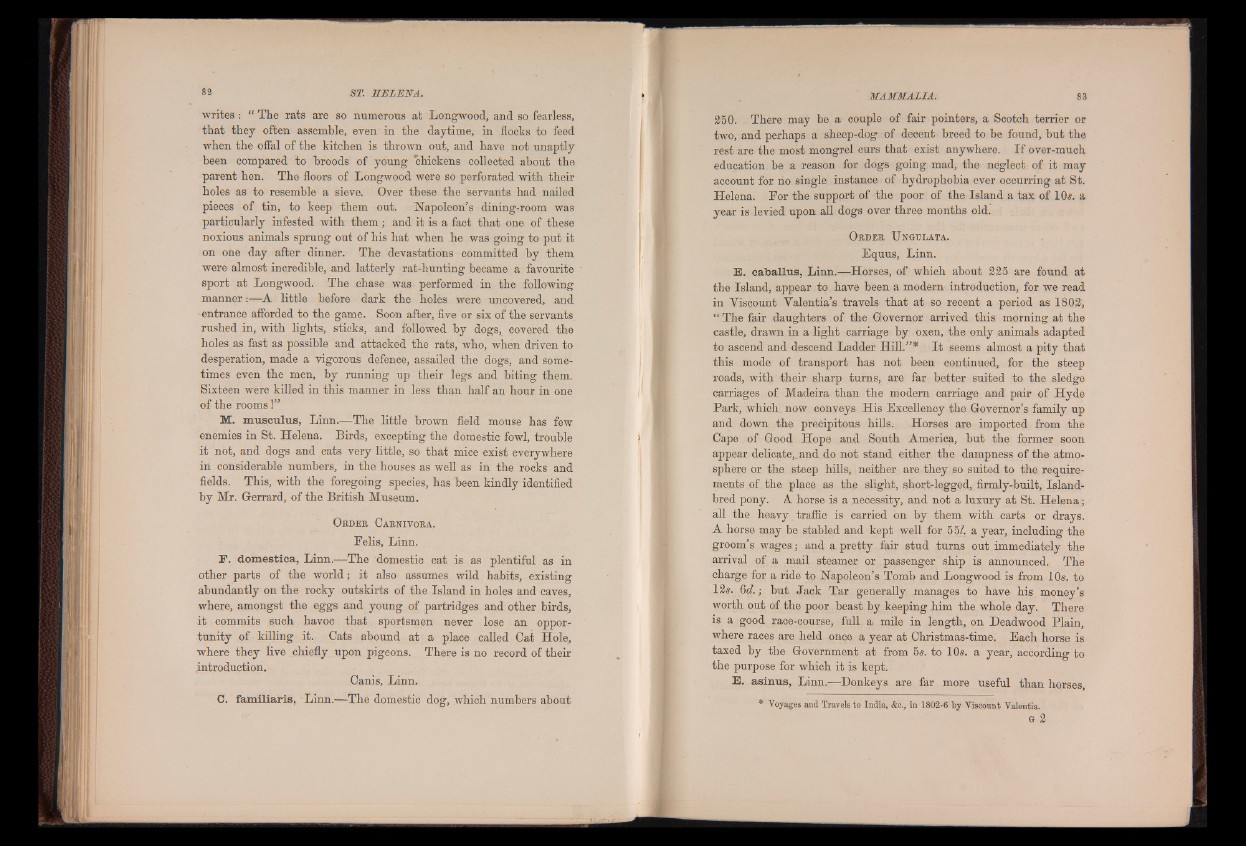
writes : “ The rats are so numerous at Longwood, and so fearless,
that they often assemble, even in the daytime, in flocks to feed
when the offal of the kitchen is thrown out, and have not unaptly
been compared to broods of young chickens collected about the
parent hen. The floors of Longwood were so perforated with their
holes as to resemble a sieve. Over these the servants had nailed
pieces of tin, to keep them out. Napoleon’s dining-room was
particularly infested with them ; and it is a fact that one of these
noxious animals sprung out of his hat when he was going to put it
on one day after dinner. The devastations committed by them
were almost incredible, and latterly rat-hunting became a favourite
sport at Longwood. The chase was performed in the following
manner:—A little before dark the holes were uncovered, and
■entrance afforded to the game. Soon after, five or six of the servants
rushed in, with lights, sticks, and followed by dogs, covered the
holes as fast as possible and attacked the rats, who, when driven to
desperation, made a vigorous defence, assailed the dogs, and sometimes
even the men, by running up their legs and biting them.
Sixteen were killed in this manner in less than half an hour in one
of the rooms 1”
M . m u s c u lu s , Linn.—The little brown field mouse has few
enemies in St. Helena. Birds, excepting the domestic fowl, trouble
it not, and dogs and cats very little, so that mice exist everywhere
in considerable numbers, in the houses as well as in the rocks and
fields. This, with the foregoing species, has heen kindly identified
by Mr. Gerrard, of the British Museum.
O r d e r C a r n iv o r a .
Felis, Linn.
F . d om e s t ic a , Linn.—The domestic cat is as plentiful as in
other parts of the world; it also assumes wild habits, existing
abundantly on the rocky outskirts of the Island in holes and caves,
where, amongst the eggs and young of partridges and other birds,
it commits such havoc that sportsmen never lose an opportunity
of killing it. Cats abound at a place called Cat Hole,
where they live chiefly upon pigeons. There is no record of their
introduction.
Canis, Linn.
C. f am i l i a r i s , Linn.—The domestic dog, which numbers about
250. There may be a couple of fair pointers, a Scotch terrier or
two, and perhaps a sheep-dog of decent breed to be found, but the
rest are the most mongrel curs that exist anywhere. I f over-much
education be a reason for dogs going mad, the neglect of it may
account for no single instance of hydrophobia ever occurring at St.
Helena. For the support of the poor of the Island a tax of 10s. a
year is levied upon all dogs over three months old.
O r d e r U n g d i.a ta.
Equus, Linn.
E. caballus, Linn.—Horses, of which about 225 are found at
the Island, appear to have been a modern introduction, for we read
in Viscount Valentia’s travels that at so recent a period as 1802,
“ The fair daughters of the Governor arrived this morning at the
castle, drawn in a light carriage by oxen, the only animals adapted
to ascend and descend Ladder Hill.”* I t seems almost a pity that
this mode of transport has not been continued, for the steep
roads, with their sharp turns, are far better suited to the sledge
carriages of Madeira than the modern carriage and pair of Hyde
Park, which now conveys His Excellency the Governor’s family up
and down the precipitous hills. Horses are imported from the
Cape of Good Hope and South America, but the former soon
appear delicate,, and do not stand either the dampness of the atmosphere
or the steep hills, neither are they so suited to the requirements
of the place as the slight, short-legged, firmly-built, Island-
bred pony. A horse is a necessity, and not a luxury at St. Helena;
all the heavy. traffic is carried on by them with carts or drays.
A horse may be stabled and kept well for 55/. a year, including the
groom’s wages; and a pretty fair stud turns out immediately the
arrival of a mail steamer or passenger ship is announced. The
charge for a ride to Napoleon’s Tomb and Longwood is from 10s. to
12s. 6d .; but Jack Tar generally manages to have his money’s
worth out of the poor heast by keeping him the whole day. There
is a good race-course, full a mile in length, on Deadwood Plain,
where races are held once a year at Christmas-time. Each horse is
taxed by the Government at from 5s. to 10s. a year, according to
the purpose for which it is kept.
E. asinus, Linn.—Donkeys are far more useful than horses,
* Voyages and Travels to India, &e., in 1802-6 by Viscount Valentia.
G 2